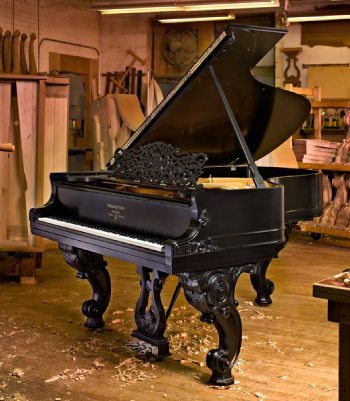Recently, the piano world was rocked with a surprise announcement that famed piano company 
This has caused quite a bit of concern about the future of Steinway. The company has faced financial problems over the years, beginning with its sale to CBS in the 1970s. It’s changed hands a few times since then, before becoming privately traded. Throughout, Steinway had struggled to maintain its reputation, even as recessions took their toil on the company.
So, the recent acquisition just adds more questions to the pile. This isn’t necessarily a disaster for Steinway and, in fact, it could even be just the thing they need. But right now, it’s all speculation.
Why The Steinway Buyout Might Not Be That Bad
One aspect of the buyout that isn’t being discussed as often is that it effectively turns Steinway into a private firm again. They’re no longer subject to the whims of Wall St, which are often focused on short-term profits in a way that aren’t conducive to luxury crafted products with a history like Steinway’s.
If your firm has over a hundred years of history, entire decades just become footnotes in the company history when times were bad. Steinway needs the freedom to refocus on proving themselves to still be the premiere piano company in the world, and they would not have gotten that freedom with New York investors demanding quarterly profit statements.
That’s the sort of environment that leads to companies compromising themselves and, ultimately, compromising their brand. I don’t think anyone wants to see Steinways in Wal-Mart, so it may be a good thing that they’re no longer answering to the investors directly.
Also, the first moves from Paulson & Co have been encouraging. Beyond the usual appeasing press releases, they announced that initially, the only cuts made to the company would be to their machined band instrument line. Since that’s exactly the sort of spin-off that ends up distracting a brand like Steinway from their core business, it’s just as well to see it go.
On the face of it, they may have the breathing room they need.
Steinway’s Uncertain Future
The proverbial X factor in this is Paulson & Co, and Paulson himself. Paulson reportedly owns several Steinways, although he doesn’t play them. It’s entirely possible that this is simply a bit of angel investment in a strong brand, and Paulson intends to allow Steinway to get back to making world-class pianos with minimal interference.
However, of course, they’re still part of a holding company, and as such, Steinway’s fortunes are now directly tied to Paulson’s continued forbearance. They could be sold off at any point, to any one, at pretty much any time. Lacking concrete assurances, that’s a somewhat precarious position for a company used to looking decades ahead.
None the less, at this point, there isn’t much reason to see dark clouds on the immediate horizon. Based on reports so far, there’s no reason to expect any change for the worse from Steinway. A Steinway is still among the best pianos in the world, and Steinway themselves will undoubtedly continue for many years to come.
In the meantime, it seems they’ve been given a chance to get away from stock market pressures, as well as being able to drop distracting spin-off lines. It’s a good first step to a rebirth for Steinway, so let’s hope Paulson continues to support them.







